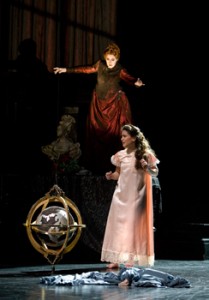 “This score is my bible,” David Schiff, the Portland composer of the chamber opera Gimpel the Fool and a lot of other good music, said with a big smile.
“This score is my bible,” David Schiff, the Portland composer of the chamber opera Gimpel the Fool and a lot of other good music, said with a big smile.
It was Friday night, and I’d run into Schiff as I was leaving the opening performance of Benjamin Britten‘s The Turn of the Screw at Portland Opera. Schiff loves Britten for several reasons, but in this case he was thinking of Britten as a shining example of how to orchestrate an opera for only a dozen instruments and have it sound full and brilliant and just right. He didn’t use the word “busy” about Britten’s score, but he talked about its muscularity, the way Britten used his limited number of instruments to maximum effect, stretching their sound and matching the dramatic texture of Myfanwy Piper‘s libretto, which is based on Henry James‘s mystifyingly open-ended ghost novella.
I’d been thinking about the opera’s orchestration because the topic came up in the pre-performance talk by Bob Kingston, who also writes the interesting blog dramma per musica. That got me to listening particularly closely to the orchestra, which was conducted with admirable precision by Christopher Larkin, and to noticing how well Britten combined tautness and lushness to bring out the strange, screw-tightening tensions of James’s tale.
There’s a practicality, an efficiency, a nothing-wasted ethic to Britten’s writing for both voice and music in this opera, and that helps to ratchet up the tension, partly because the music rarely allows you the sonic and emotional release of the Big Moment — it just moves relentlessly on, turning and turning the screw. Yet it’s also a rich score, with surprises and twists and little turns of humor; a heady, rewarding work that is unapologetically 20th century in its musical language (it premiered in 1954) even though it evokes the spirit of a turn-of-the-century novel about a 19th century series of events.
Portland Opera’s production is clean and handsome to look at and well-acted and well-sung, which pretty much covers the bases. The boy Miles is sung by 10-year-old Michael Kepler Meo, who has a lovely crisp singing tone and natural dramatic presence. Among the fine cast I particularly liked the sinister-Puckish Ryan MacPherson as the demonic Peter Quint and Metropolitan Opera vet Judith Forst as the distracted housekeeper, Mrs. Grose. And kudos to designer Peter Werner for, among other things, all that ghostly-white makeup on the entire household staff of the creepy old mansion. Catch this show if you can.
**************************
It’s a wonder I made it to the Jamesean ghosts of Friday night, because on Monday night I encountered a flock of vampires at Open City, the festival-ending collection of eight short plays written for the city’s inaugural Fertile Ground festival of new plays. You can read a lot more about this ground-breaking festival over at Blogorrhea, the virtual home of Mead Hunter, who was at least hip-deep and probably up to his eyebrows in pulling the whole thing off.
There seemed to be vampires lurking around several corners of this fertile-y imagined Portland: maybe they were night-tripping “Twilight” characters, down for a quick visit from the Olympic Peninsula in search of new blood.
At any rate, among all the little dramas in all the corners of the city (eight playwrights, drawing from a hat, chose a single location in Portland as the site for his or her short play) I remember several with affection but most vividly Nick Zagone’s
Your Everyday Blood Market, a preposterously fevered solo show about a fang-toothed seductress who leads a clerk at Powell’s City of Books astray and presumably to his doom. What’s hilarious about this piece is the spot-on way that Zagone caricatures two grand old Portland traditions — Powell’s and the granola-fied Saturday Market.
I also liked, among others, Patrick Wohlmut’s cacaphonic symphony of voices Skidmore Fountain: November 1st, or, All We Are Is Stories; and Steve Patterson’s prickly, sardonic yet oddly sweet First Thursday.
So, Fertile Grounders: same time, next year?
Pingback: A tightly sprung turn of the screw | Oregon ArtsWatch()